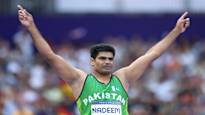Paris Olympics on channels 26.7.–11.8. Go to the competition website here. You can find the entire program of the games here.
On the night between Thursday and Friday, the vast majority of Pakistan’s 240 million inhabitants sat glued to the television – some at home in front of fans, others in small villages at the only receiver in the sky.
Would the 27-year-old javelin thrower win Arshad Nadeem of neighboring India, which is considered a blood enemy By Neeraj Chopra?
Nadeem not only won his country’s first Olympic medal in over 30 years, but also set a new Olympic record: 92.97 meters. It was also the country’s first individual Olympic gold.
For Pakistanis, this victory was a rare opportunity to feel proud of the country’s achievements.
– Especially in these dark times, when the price of electricity has skyrocketed and inflation is skyrocketing, we needed news like this, says the housewife Madeeha Dogar From Karachi, the largest city in Pakistan.
The country has suffered severe political and economic crises in recent years, and people haven’t had much reason to celebrate. For many, Nadeem’s victory symbolizes the fight of a small person against a corrupt system.
– This was like a glimpse of the sun in the middle of the storm, Dogar sums up.
Nadeem is now a national hero.
– I hope that the state representatives will receive him when he arrives in the country. Pakistanis go to the airport in droves anyway.
From poverty to international arenas
Nadeem’s victory is made even more impressive by the man’s poor background in Pakistan.
He was born in 1997 in a small village in the state of Punjab in the eastern parts of the country. Nadeem’s father worked as a construction worker, and with a small salary, he could barely bring food to the table for a family of nine. Meat was eaten only on holidays.
Nadeem became interested in sports already at school and started competing at the regional level in various sports. His father encouraged him.
One day, a member of the Punjab State Sports Club happened to see a young man competing and offered to coach him in the javelin.
For the family, the decision to let Nadeem continue playing sports meant that the boy might never bring home much money. However, this did not bother father and the other brothers – they wanted to support Nadeem.
18-year-old Nadeem won the Pakistan javelin championship in 2015. A year later, he competed at the international level for the first time in India and brought home a bronze.
Last year, Nadeem won silver at the World Athletics Championships in Budapest.
With international success, Nadeem started getting sponsors and private backers. Still, even this was not always enough.
Can’t afford to support sports
Mansoor Ahmed Khanwho served for years as the deputy director of the Pakistan Sports Council, has followed Nadeem’s career closely from the beginning. He answers the phone from Islamabad, the capital of Pakistan.
– All credit goes to Arshad Nadeem. This is his victory alone, he says.
Nadeem did not get much support from the Pakistani state during his career. Before the Olympics, he asked the communication service X for help with a new spear.
Almost throughout his career, Nadeem has also often had to finance part of his travel expenses to international competitions himself. They have not been fully covered by the Pakistan Sports Commission grant. This time, he was the only one from Pakistan’s Olympic team whose trips were paid for.
According to Khan, there is generally no investment in sports in the country – except when it comes to cricket, by far the most popular sport in the country.
– Pakistan is a poor country, so of course this is not very high in the state’s priorities.
While many others, like fellow competitor Chopra, benefited from training in Europe, Nadeem trained in Pakistan. In May, he prepared for the Olympics in 45 degree heat in the city of Lahore.
– Now everyone is trying to take credit for his victory and are giving him cash prizes, plots of land and so on, says Khan.
Khan hopes that with the Olympic victory, other sports will start to be invested in Pakistan.
– Now Nadeem will hopefully be listened to and maybe learn from him.
From grumbling
Former captain of the Pakistan rugby team Kashif Khwaja hopes that more funding will be sought from the private sector.
He has been involved with rugby in Pakistan for two decades and has seen with his own eyes how little support is available for the less popular sports.
– Dependence on government funding is not necessarily the best idea, because the country’s economic situation is very weak. I don’t think it will be possible to put enough funding into sports in the near future, he says.
Many have had to abandon their dreams of a career in sports for financial reasons in Pakistan.
– Considering our population, the number of athletes that come from our country is shocking. It should definitely be bigger.
According to Khwaja, things are often done the wrong way in Pakistan. Now that Nadeem has won the Olympic gold, he is showered with promises of funding and prizes.
– If you really want to support sports in Pakistan, it should start at the grassroots level among the youth, Khwaja points out.
